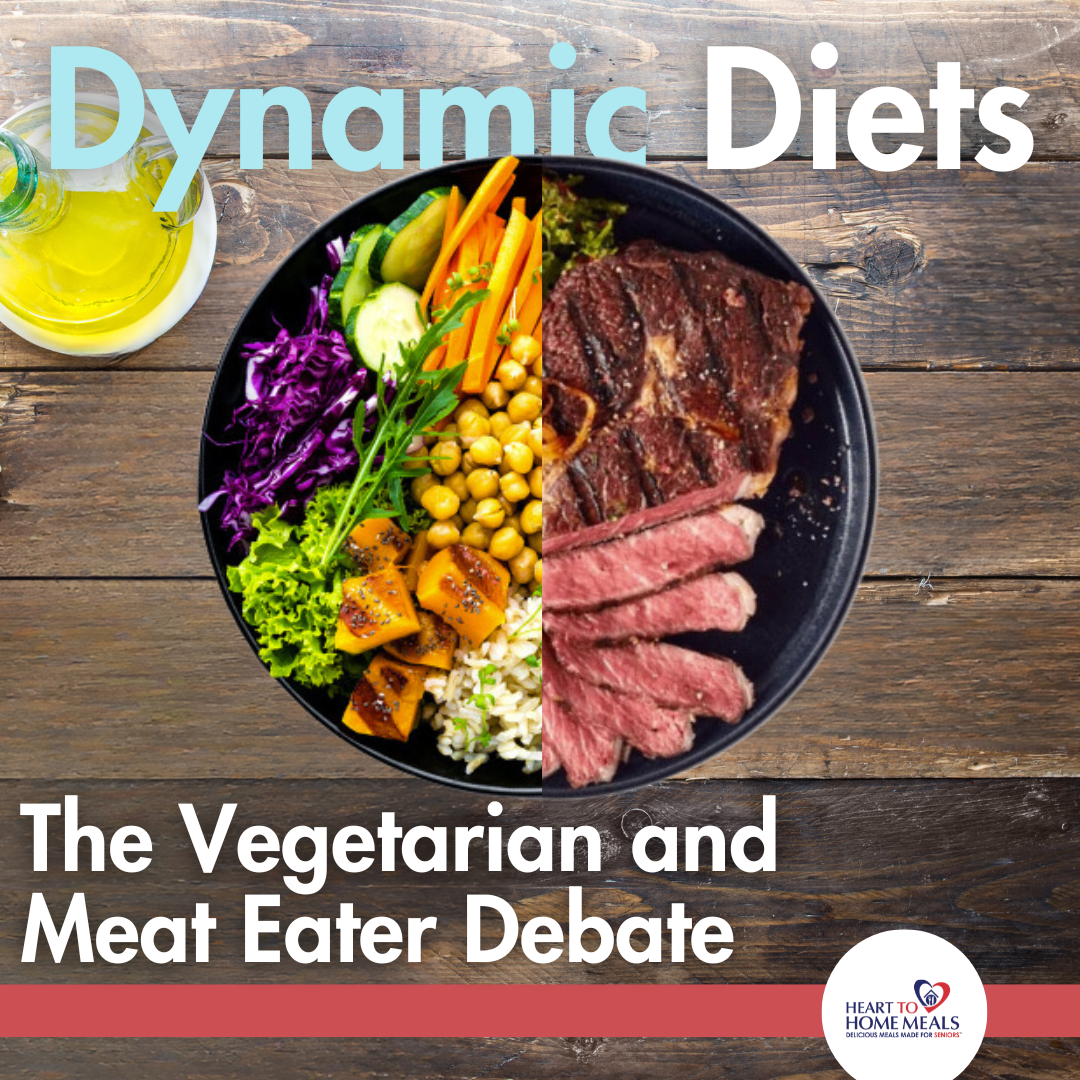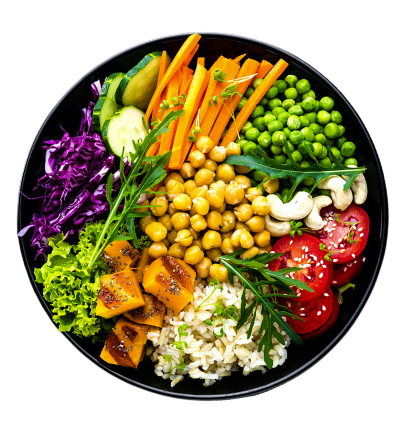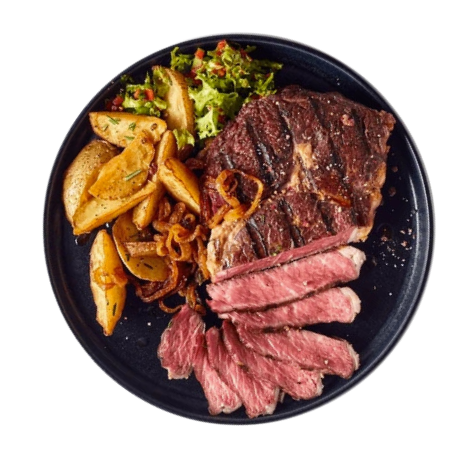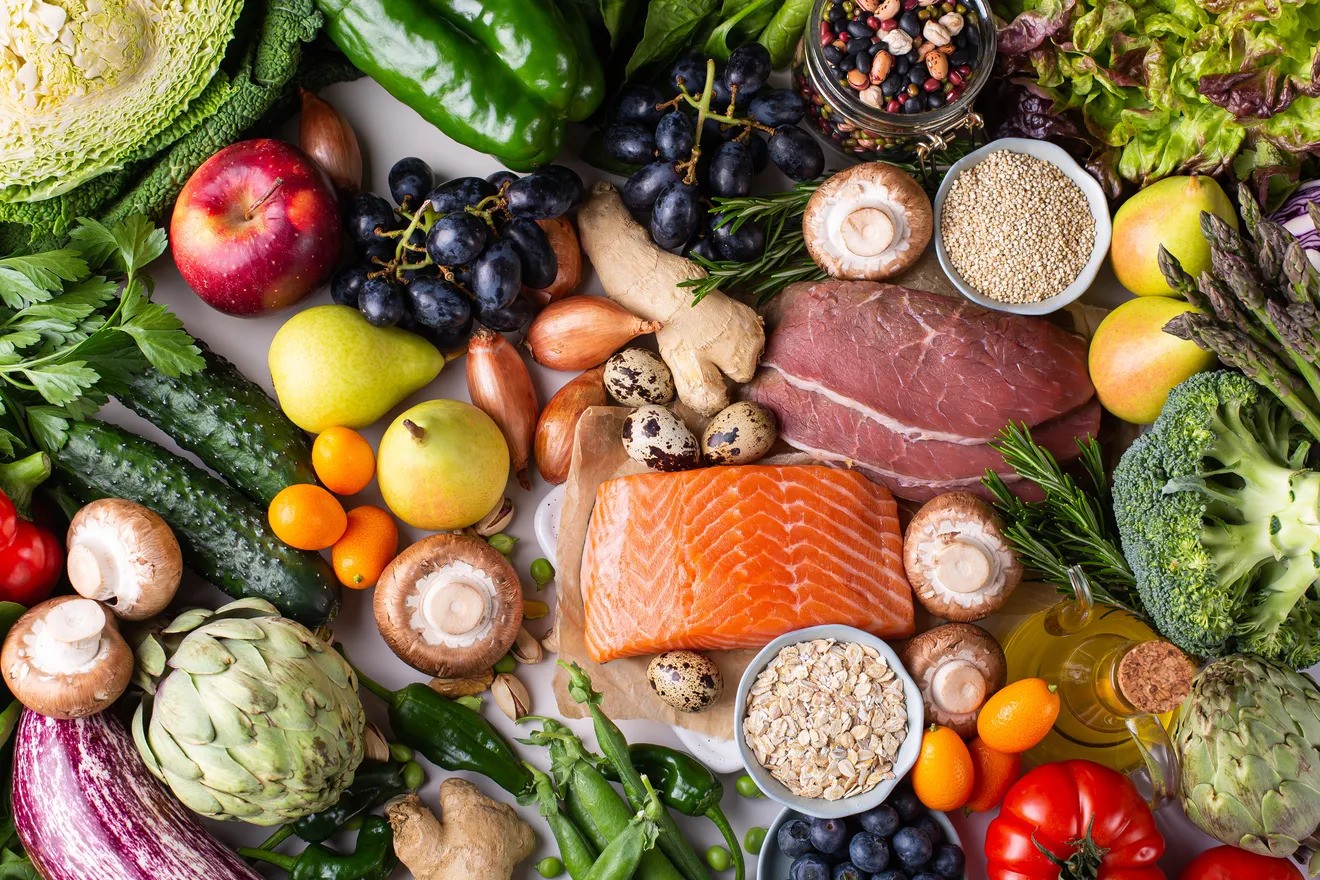.png?lang=en-CA)
We hear these recommendations all the time: A vegetarian diet is best for your health. Eating meat is essential to avoid nutrient deficiency. One is better than the other.
In the ongoing conversation surrounding dietary preferences and their effects on vitality, the divide between vegetarianism and meat-eating often dominates the conversation. So which is it? With such a stark contrast between diets, how do we navigate these recommendations to find a path towards optimal health and nutrition as we age?
While seniors may live extremely healthy, well-balanced lives with either diet, as both vegetarianism and eating meat provide unique nutrition and health benefits, there are also considerations to be aware of. As we explore the benefits and potential setbacks of both ways of eating, will one diet reign supreme? Or is the optimal diet perhaps one that seeks to find a middle ground, a holistic approach to nutrition that combines the best of both worlds?
The Vegetarian Diet: Plant Power

The vegetarian diet emerges as a potential nutritional powerhouse, emphasizing plant-based foods brimming with essential nutrients, fibre, and antioxidants. By abstaining from meat, seniors can still reap a multitude of health benefits while nurturing environmental and ethical awareness. However, meticulous attention to nutritional adequacy is imperative to ensure health in the vegetarian diet.
Foods in Focus
Legumes: From hearty lentils to varieties of beans, legumes serve as the cornerstone of senior vegetarian nutrition, offering plant-based protein, fibre, and a bounty of micronutrients. Rich in protein, legumes are essential for muscle maintenance and repair, allowing us to stay active longer. Additionally, they provide a significant source of iron, crucial for combating age-related anemia and sustaining energy levels.
Whole Grains: Quinoa, rice, and oats stand as nutritional backbones, delivering sustained energy and digestive health benefits to seniors. These whole grains are packed with fibre, supporting overall health and well-being.
Fruits and Vegetables: There’s no secret that rainbow foods should be on everyone’s plates, providing a wealth of vitamins, minerals, and antioxidants essential for combating age-related stress. Fruits and vegetables are key sources of nutrients such as vitamin C, potassium, and folate that support immune function, heart health, and cognitive function in aging adults. Leafy green vegetables such as spinach and kale are also incredible sources of iron.
Dairy Alternatives: Fortified plant milks, yogurt, and cheese alternatives reap the bone-strengthening benefits of calcium and vitamin D without the dairy, which is an intolerance for many. Fortified dairy alternatives offer essential nutrients like calcium and vitamin D, supporting bone density and reducing the risk of osteoporosis in seniors.
Plant-Based Proteins: Other plant-based sources such as soy, tempeh, and artificial meats are also very rich in protein and provide a significant source of iron for when you don’t want to consume legumes. Incorporating various plant-based protein sources into their diets allows seniors to enjoy a variety of flavorful options while meeting nutritional needs.
Considerations and Risks
While a vegetarian diet can provide an array of health benefits for seniors, including reduced risk of chronic diseases, enhanced digestive health, and ethical and environmental benefits, there are some key considerations and risks to the diet. With proper planning and variety in food choices however, meeting nutritional requirements can absolutely be possible for seniors.
Potential nutrient deficiencies and imbalances pose a greater threat to vegetarians. Seniors must remain vigilant to avoid vitamin B12, iron, omega-3 fatty acid, and zinc deficiencies that may occur in vegetarian diets, as these nutrients and minerals are more easily found, in the quantities that we need for proper nutrition, in animal sources and proteins. To mitigate this risk, choosing plant-based foods in every meal that contain sources of protein and iron are important. As well, taking vitamins and other health supplements can help to bridge the gap between a vegetarian diet and adequate nutrient absorption, if food itself is not enough.
Click to try our Vegetarian Shepherd’s Pie and Vegetarian Bean Chili for veggie options packed full of healthy legumes, vegetables and essential carbohydrates. Low in saturated fat and high in protein, fibre, calcium, iron and potassium, these meals provide the perfect balance between flavour and ultimate nutrition.
The Meat Eater Diet: Animal-Derived Nourishment

In contrast to its vegetarian counterpart, the meat eater diet offers unparalleled abundance of protein options, bioavailable nutrients, and savoury indulgence. While meat, fish, and other animal-based sources play a central role in this diet, moderation and mindful consumption are key to safeguarding optimal nutrition, as excessive red and processed meats may cause more harm than good.
Foods In Focus
Lean Meats: Chicken, turkey, and lean cuts of other meats offer seniors complete sources of protein without excessive saturated fat or additives. These lean meat options are essential for maintaining and supporting muscle mass, strength, and long-term function, while remaining calorie wise.
Red Meats: Red meat such as beef, lamb, and pork offer seniors rich sources of protein and iron, readily absorbed by the body to support optimal hemoglobin levels and combat age-related anemia. Additionally, red meats act as one of the best sources of zinc, indispensable for immune function, and linked to wound healing, cellular metabolism, and the slowing of age-related vision degeneration.
Fatty Fish: Fatty fish such as salmon provides seniors with an unparalleled source of omega-3 fatty acids, bolstering heart health and cognitive function. Enjoying fatty fish as part of one’s diet offers benefits vital to cardiovascular health and cognitive function.
Eggs: Eggs are a versatile and nutrient-dense food enjoyed by many meat eaters, offering complete protein sources along with essential vitamins and minerals such as vitamin B12, necessary for neurological function, as well as iron and zinc.
Dairy Products: Milk, cheese, and yogurt are rich in calcium and vitamin D, which are vital in supporting bone density and reducing the risk of osteoporosis and fractures. Without factoring in nutrient fortification, dairy products often offer more nutrients than their plant-based dairy counterparts.
Considerations and Risks
While the meat eater diet provides a variety of high-quality protein and nutrients, excessive consumption of meats, particularly red and processed meats, may pose risks to cardiovascular health. Red meats tend to be higher in saturated fats, as well as calories, which could also lead to unintentional weight gain and lower energy levels. This is why the necessity for mindfulness and moderation is so important when consuming meats.
Consuming too many animal products may also pose environmental and ethical concerns, as the meat industry not only is plagued by discourse on animal cruelty and excessive production, but also emits greater greenhouse gas emissions through its production than a vegetarian diet emits. Sustainable and healthy consumption of meat is very possible though, if consideration is placed on limiting frequency of consumption.
Click to try our Chicken Breast with Gravy and Stuffing and Salmon Teriyaki for healthy meat options jam packed with protein and iron, and low in fats. These meals are bursting with flavour and provide dynamic, well balanced nutrition with plenty of vegetables and healthy carbs.
Finding Balance

Well-rounded nutrition is possible under both vegetarian and meat eater diets. The most important factor is to make the right choices that suit your lifestyle and needs. By adopting a balanced diet and emphasizing mindful consumption, we are each able to create our own holistic diet approach that optimizes senior health, prioritizes essential nutrient and whole food consumption, and limits potential deficiencies and risks.
Recommendations
1. Incorporate Plant-Based Foods: Focus on foods such as fruits, vegetables, whole grains, and legumes for fibre, antioxidants, and essential nutrients.
2. Include Lean Protein Sources: Incorporate lean meats, fish, and legumes for muscle maintenance and immune support.
3. Practice Mindfulness and Moderation: Consuming meats in moderation, particularly red and processed meats, provides balanced protein and zinc intake while minimizing saturated fat and potential cardiovascular and weight related issues.
4. Consider Ethical and Environmental Factors: Limiting the frequency of meat consumption is not only beneficial to overall health, but it also promotes environmental sustainability and consciousness.
5. Diversify Your Plate: Explore a variety of flavours and foods from both plant-based and animal-derived sources for nutritional diversity and optimal vitamin and mineral absorption.
6. Take An Individualized Dietary Approach: Always tailor dietary recommendations to your own preferences, health conditions and requirements, and lifestyle for a personalized and satisfying dietary journey.
At Heart To Home Meals, we aim to provide a path towards optimal senior nutrition no matter the diet. Whether you opt for a vegetarian diet, eating meat, or find a balance in between both, we are here for you. Allow us to be a part of your healthy aging journey by clicking here to see all of our balanced meal options.


